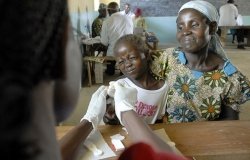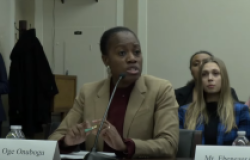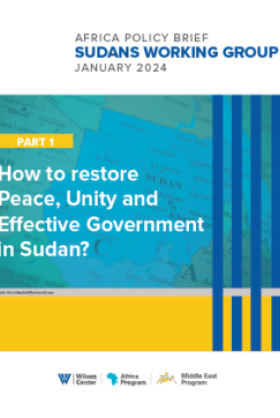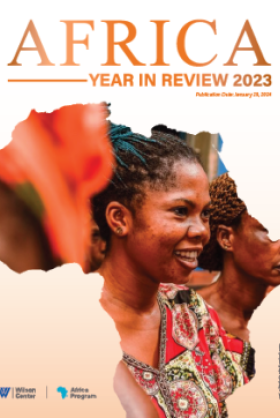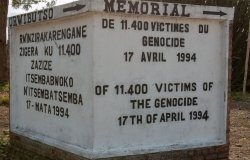A Briefing on Somalia
On October 18, 2007, the Africa Program hosted Ambassador John M. Yates, U.S. Special Envoy to Somalia, who identified three crucial American foreign policy objectives there: eliminating the terrorist threat, promoting political stability, and addressing Somali humanitarian needs.
Overview
On October 18, 2007, the Africa Program at the Woodrow Wilson International Center for Scholars hosted a briefing on the current situation in Somalia by Ambassador John M. Yates, U.S. Special Envoy to Somalia.
Ambassador Yates began his remarks by emphasizing that "the United States continues to engage with the leadership of the Transitional Federal Government (TFG) and Somali stakeholders across the political spectrum to achieve U.S. foreign policy objectives in Somalia." He identified three main American foreign policy objectives in Somalia:
• Eliminate the terrorist threat;
• Promote political stability and establish a functioning central government; and,
• Address the pressing humanitarian needs of the Somali people.
Ambassador Yates underlined the interconnected nature of these goals by saying, "neither the humanitarian crisis nor the extremist elements will go away without a stable government. Likewise, the government is unlikely to become stronger without a political process that isolates extremist elements in Somalia."
According to Yates, the U.S. is encouraging political dialogue between TFG institutions and other key Somali stakeholders in order to resume the transitional process and prepare the country for national elections in 2009. Holding free and fair elections in 2009 will be a crucial step towards the restoration of governance and long-term stability. Also, the U.S. government is working to help the African Union's Mission in Somalia (AMISOM) to achieve full deployment. Finally, international assistance to help increase the mid-level government capacity of TFG institutions is being mobilized.
As examples of active U.S. engagement in Somalia, Ambassador Yates pointed to regular contact between his Somalia Unit which is based at the U.S. Embassy in Nairobi, Kenya, and key TFG figures, in particular, President Ahmed, Prime Minister Gedi, and Parliament Speaker Sheik Nur "Madobe." While recognizing some flaws of the National Reconciliation Conference (NRC) which took place in July and August of this year, Yates described the NRC as a milestone on the road to the 2009 elections. He called on all Somali actors to participate peacefully in the transition process and to work towards elections and stability. Yates pointed out that to achieve longer term security sector reform, the first step for Somalia is a cease-fire between all armed Somali groups.
Specifically with regard to humanitarian issues, the U.S. Agency for International Development (USAID) provided approximately $60 million in humanitarian assistance between fiscal years 2007 and 2008 to programs in Somalia run by the United Nations, other international agencies and NGOs.
In closing, Ambassador Yates shared a recent example of American engagement with key Somali figures. He hosted an Iftar dinner, celebrating the breaking of fast during the Muslim holy month of Ramadan. Over 80 Somalis gathered with the Somalia Unit staff in Nairobi on September 30th to celebrate the iftar. Ambassador Yates was struck by how this event brought together a cross-section of Somali society. The meal was an opportunity for dialogue among stakeholders that would normally never sit down at the same table.
During a lively question and answer session moderated by the Consulting Director of the Africa Program, Steve McDonald, Ambassador Yates fielded a variety of pointed questions regarding the humanitarian situation on the ground, Ethiopian troops on Somali soil, the fundamentalist opposition group which is endorsed by the Islamic Courts Union and which recently held a conference in Asmara (Eritrea). He affirmed his belief that a lasting change in the humanitarian situation in Somalia is predicated on finding solutions to the security and political questions at hand. Ambassador Yates said that it is the policy of the U.S. Government to facilitate the withdrawal of Ethiopian troops from Somalia, but at the same time noted the lack of an effective force to fill the vacuum caused by an Ethiopian withdrawal. He called for at least 6400 more African Union troops on the ground in Somalia in order to alleviate the humanitarian crisis. In response to a question concerning recent Saudi Arabian hosting of NRC participants and the role of other Arab states, Yates issued an open invitation to Middle East partners to become more involved in Somalia's transition, but reiterated that a genuine peace cannot be imposed externally but will eventually arise from Somalis themselves. Finally, when asked by an attendee to sum up the situation in Somalia in three words, Ambassador Yates stated simply: "Dismay. Concern. Hope."
Drafted by Robert Hurtekant, Intern and Roseline Fodouop Tekeu, Program Assistant, Africa Program.
Documents & Downloads
Hosted By

Africa Program
The Africa Program works to address the most critical issues facing Africa and US-Africa relations, build mutually beneficial US-Africa relations, and enhance knowledge and understanding about Africa in the United States. The Program achieves its mission through in-depth research and analyses, public discussion, working groups, and briefings that bring together policymakers, practitioners, and subject matter experts to analyze and offer practical options for tackling key challenges in Africa and in US-Africa relations. Read more
Thank you for your interest in this event. Please send any feedback or questions to our Events staff.




